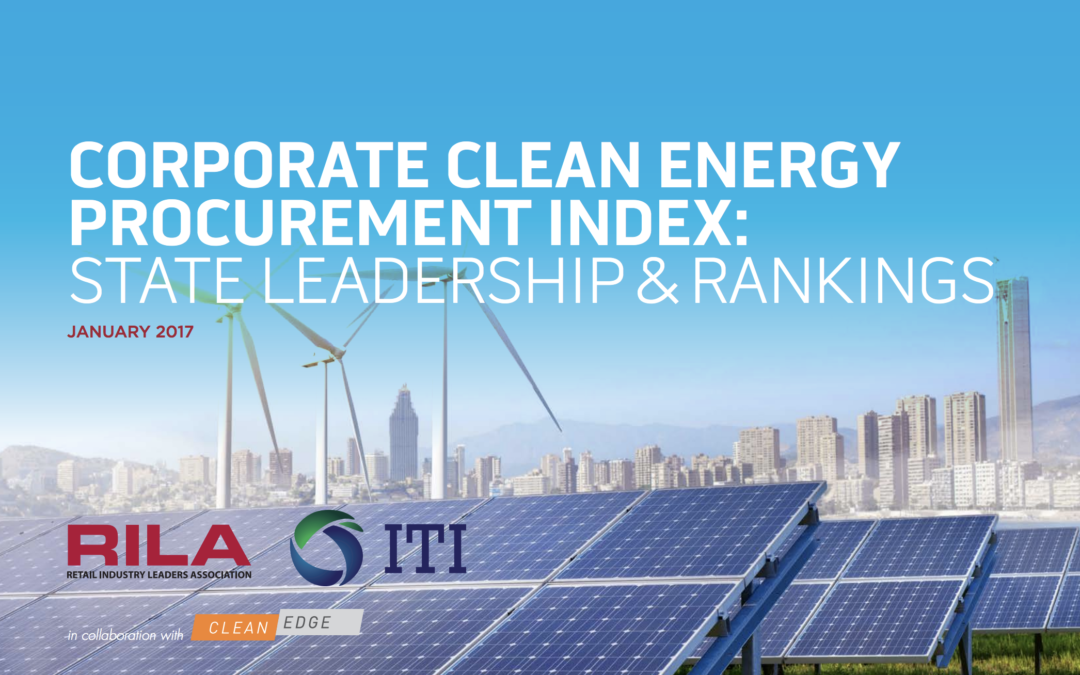David Gardiner and Associates contributed to a groundbreaking study released today that ranks all 50 states based on the ease with which companies in the retail and information technology sectors can procure renewable energy and urges state governments to promote customer choice of renewable energy. The Corporate Clean Energy Procurement Index: State Leadership & Rankings, released by the Retail Industry Leaders Association (RILA) and the Information Technology Industry (ITI), concludes that states that enable investment in clean domestic energy production are most likely to attract America’s largest job-creating businesses.
The report focuses on state renewable energy policy and the critical role that access to low-cost renewable energy can play as part of any state economic development strategy. The report notes that “the structure of a state’s electricity market can directly influence where corporations choose to invest in renewable energy projects, and in which states they decide to expand their operational footprint.”
Retail and tech companies such as Amazon, Apple, Facebook, Google, Microsoft, Target and Wal-Mart are among nearly half of the Fortune 500 companies seeking to locate operations in states with clean energy production due to fossil fuel price volatility and pollution concerns.
The report offers a five-point action plan for state policymakers to support the growth of corporate renewable energy deployment:
- Remove barriers to corporate deployment of both onsite and offsite renewable installations
- Support the development of next-generation options to purchase renewable energy through utilities in regulated markets
- Expand energy choice options for C&I customer in regulated markets
- Ensure that an adequate market exists for renewable purchasing through both utilities and third-party programs
- Ensure that renewable energy in both regulated and deregulated markets can scale up rapidly
Statements from Corporate Leaders and State Policymakers:
“Iowa is proud to be the top ranked state for renewable energy procurement by the nation’s retail and technology industries,” said Iowa Lieutenant Governor Kim Reynolds. “Access to low-cost renewable energy is a critical part of our economic development strategy. These job-creating businesses cite our access to low-cost renewable energy as a major reason for locating in Iowa. In fact, Iowa’s newly released state Energy Plan underscores Iowa’s leadership in renewable energy and the significant role it plays in our economy. Every Iowa wind turbine means income for farmers, revenue for counties and jobs for Iowa families.”
“As adoption of the cloud accelerates, so does the energy consumption of the datacenters that power the cloud. Meeting these energy needs with renewable energy is good for our business, the economy, and the environment,” said Dan’l Lewin, corporate vice president of technology and civic engagement at Microsoft. “Our clean energy investments provide economic and sustainability benefits to the communities where we operate, while enhancing the reliability of the local grid. We hope this report will create opportunities to expand this work.”
“Walmart is proud to be recognized as a leader in renewable energy procurement, and we are encouraged that a number of states have made significant efforts to support the practice,” said Mark Vanderhelm, Vice President – Energy, Walmart. “Much work remains to be done, and we look to these efforts to determine the best practices that will drive the broader creation of cost-effective, customer-focused, and operationally sustainable renewable energy procurement programs.”
“Retailers are at the forefront of the growing trend to procure clean energy to power their operations; this index will help them focus on the states that are conducive to doing business. We urge state governments to look hard at steps they can take to promote customer choice for renewable energy so that they can open the doors to new investments,” said Adam Siegel, Senior Vice President, Research, Innovation & Sustainability at RILA.
“The technology industry is increasingly transitioning to clean energy to meet customer demands, consumer expectations and our own strong sustainability commitments. Clean and renewable energy sources are good for the environment, and they provide energy reliability and price stability benefits that are good for business. States interested in growing their tech sector should embrace this trend,” said Rick Goss, Senior Vice President for Environment and Sustainability for ITI.
To keep tabs on other news related to large customer clean energy procurement and state customer choice policy, follow @CustomerRenew on Twitter.
